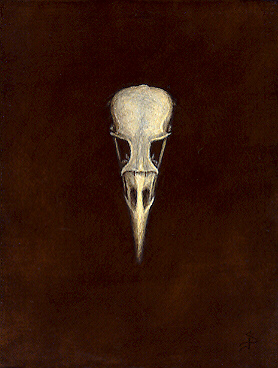Art Artistic Motivations: Birds Painting Skull
by David Jay Spyker
leave a comment
The Lost

"The Lost", 2000, 5 x 3 3/4 in., Acrylics on Hardboard
In representational art, a man or woman pondering the human skull is used to convey an awareness of mortality, or more accurately, mankind’s awareness of his own mortality. The presence of a human skull in painting is a reminder that each of us is here only for a short while, and that our time is indefinite and unknown.
The bird skull in “The Lost” is meant to remind us of the interconnectedness and mortality of every living being with which we share this ever-shrinking globe. It is tiny, fragile, easily overlooked; and while the bird is living, it is swift and fleeting, impossible to simply grasp in one’s hand.
I found this particular skull in a hedge row in my overgrown back yard. I looked down, and it was just lying there atop a single brown leaf in the midst of a patch of dead leaves, pale and ghostly in the near twilight like someone had carefully placed it there as an offering. I could easily have missed it – and stepped on it – as I crept beneath the tangled branches. I knew I had to paint it.
“The Lost” is a small, simple painting. There is no one to ponder the skull; only the skull – painted in life size – hovers before you, the viewer. You are the philosopher, meant to think over this tiny thing. It is intended to engage you, and make you the human element to this painting.